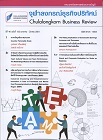มาตรวัดบุคลิกภาพประเทศ
Main Article Content
Abstract
ABSTRACT
Country personality was drawn from the brand personality construct. As it is the process of bringing the human traits to describe a country image. The purpose of this research aimed to develop the country personality scale. The researcher collected the data by using questionnaires on 863 undergraduate students from Kasetsart University Chalermphrakiat Sakon Nakhon Province Campus. Exploratory factor analysis and confirmatory factor analysis were used to analyse the data in order to develop the country personality scale.
The results of the study indicated three dimensions of the country personality scale, which comprised of 24 traits. The three dimensions were labeled as follows: 1) dependability (9 traits including flexible, honest, neat, orderly, peaceful, pedantic, respectable, secure and tolerant) 2) charming (7 traits including cheerful, chic, clever, contemporary, cool, creative and developed/advanced), and 3) unattractiveness (8 traits including impolite, insincere, unattractive, underdeveloped, uneducated, unfriendly, unhurried and unstable).
The country personality scale has a high level of the convergent validity, the discriminant validity and the reliability so that it can be used to measure the country personality. As if the result indicates a positive personality, the country should continually conserve it. On the other hand, if the result indicates a negative personality, the country should adjust and develop it, in order to position the country in the right and suitable aspect. However, there are some limitations in this research that can be improved for future research. Such as, in the process of choosing the adjectives, the researcher should find a suitable rule to use as a context of a research, or in the process of interview, the researcher may allow the samples to choose a country that they are familiar with. As a result, these could lead to the suitable adjectives that imply the personality clearly and precisely.
Article Details
Opinions and discussions in papers published by the Creative Business and Sustainability Journal (CBSJ) are deemed as personal opinions and the responsibility of the writers. They are not the opinions or responsibility of the Chulalongkorn Business School of Chulalongkorn University.
Papers, content, information etc. appearing in the Journal are deemed to be the copyright property of the Chulalongkorn Business School of Chulalongkorn University. Anybody or any organization that wishes to publish any part of them or use them in any way must obtain written permission from the Chulalongkorn Business School, Chulalongkorn University.


